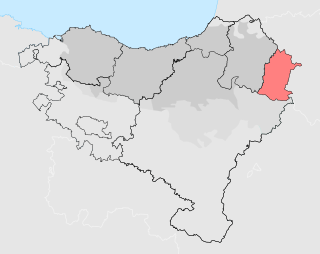|
Souletin dialect
Souletin or Zuberoan (Basque: Zuberera) is the Basque dialect spoken in Soule, France. Souletin is marked by influences from Occitan (in particular the Béarnese dialect), especially in the lexicon. Another distinct characteristic is the use of xuka verb forms, a form of address including in third person verbs the interlocutor marker embedded in the auxiliary verb: jin da → jin düxü (s/he came → s/he came to you). NameIn English sources, the Basque-based term Zuberoan is sometimes encountered. In Standard Basque, the dialect is known as zuberera (the province name Zuberoa and the language-forming suffix -era). Various local forms are üskara, xiberera and xiberotarra. In French, it is known as souletin. In Spanish, the dialect is called souletino or suletino. DistributionThe southern dialect Roncalese was sometimes included within Zuberoan. A Basque language variety close to Zuberoan may have extended more to the east, into the Central Pyrenees, as attested by placenames and historical records about the Basque peoples (Wascones, qui trans Garonnam et circa Pirineum montem habitant, 'Vascons, who reside beyond [river] Garonne and around the Pyrenees' in the Royal Frankish Annals[citation needed]). Phonology
In addition to the five vowels present in all other Basque dialects, Zuberoan also has a close front rounded vowel /y/ (written ü), which is markedly noticeable to speakers of other varieties. All six vowels can be nasalized (/õ/ is absent in some Souletin varieties), with nasalization being phonemic.[3][4] It is likely that the sixth vowel arose influenced by the Béarnese vowel shift some centuries ago instead of being an ancient vowel lost in other dialects of Basque.[citation needed] Souletin features the voiceless aspirated stops /pʰ/,/tʰ/,/kʰ/, which contrast with their unaspirated counterparts. The alveolar tap /ɾ/ present in other dialects has been lost in Souletin.[3] The voiced fricatives /z̻/,/z̺/ are found almost exclusively in loanwords, they are present in other varieties only as allophones of their unvoiced counterparts. The phoneme /ʒ/ (written as j) corresponds to /x/ in other varieties.[5] The voiceless nasal glottal approximant /h̃/ is found exclusively in intervocalic position, and triggers the nasalization of the adjoining vowels.[6] ExampleThis example of the "Orreaga"[7] ballad composed by Arturo Campion shows some differences between this dialect and the standard Basque (Euskara batua).
See alsoNotes
ReferencesCitations
Sources
|
|||||||||||||||||||||||||||||||||||||||||||||||||||||||||||||||||||||||||||||||||||||||||||||||||||||||||||||||||||||||||||||
